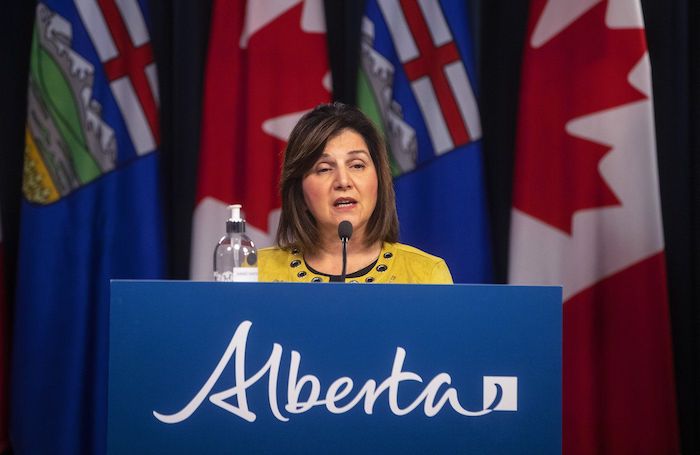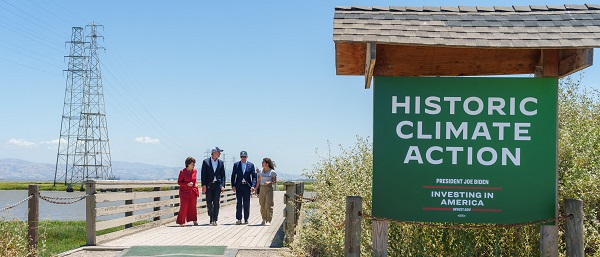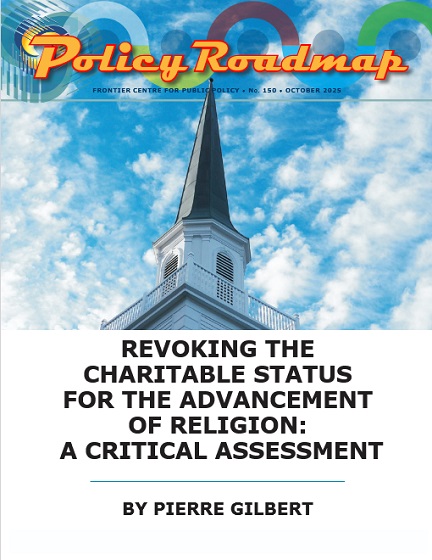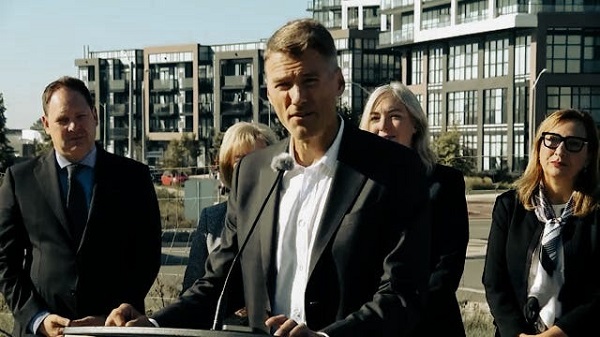Alberta
Health Minister Adriana LaGrange charged with extensive to do list

Minister of Health mandate letterPremier Danielle Smith has issued a mandate letter to Minister of Health Adriana LaGrange calling on her to ensure Albertans have improved access to world-class health care. In her letter, the Premier outlines her expectations that Alberta fosters an environment within AHS and the entire health community that welcomes innovation and incentivizes the best patient care within the pillars of the Canada Health Act so that no Albertan will ever have to pay out-of-pocket to see their doctor or receive a needed medical treatment. The Premier asks Minister LaGrange to deliver on platform commitments including:
The Premier also tasks Minister LaGrange with:
|
Alberta
Enbridge CEO says ‘there’s a good reason’ for Alberta to champion new oil pipeline

Enbridge CEO Greg Ebel. The company’s extensive pipeline network transports about 30 per cent of the oil produced in North America and nearly 20 per cent of the natural gas consumed in the United States. Photo courtesy Enbridge
From the Canadian Energy Centre
B.C. tanker ban an example of federal rules that have to change
The CEO of North America’s largest pipeline operator says Alberta’s move to champion a new oil pipeline to B.C.’s north coast makes sense.
“There’s a good reason the Alberta government has become proponent of a pipeline to the north coast of B.C.,” Enbridge CEO Greg Ebel told the Empire Club of Canada in Toronto the day after Alberta’s announcement.
“The previous [federal] government’s tanker ban effectively makes that export pipeline illegal. No company would build a pipeline to nowhere.”
It’s a big lost opportunity. With short shipping times to Asia, where oil demand is growing, ports on B.C.’s north coast offer a strong business case for Canadian exports. But only if tankers are allowed.
A new pipeline could generate economic benefits across Canada and, under Alberta’s plan, drive economic reconciliation with Indigenous communities.
Ebel said the tanker ban is an example of how policies have to change to allow Canada to maximize its economic potential.
Repealing the legislation is at the top of the list of needed changes Ebel and 94 other energy CEOs sent in a letter to Prime Minister Mark Carney in mid-September.
The federal government’s commitment to the tanker ban under former Prime Minister Justin Trudeau was a key factor in the cancellation of Enbridge’s Northern Gateway pipeline.
That project was originally targeted to go into service around 2016, with capacity to ship 525,000 barrels per day of Canadian oil to Asia.
“We have tried to build nation-building pipelines, and we have the scars to prove it. Five hundred million scars, to be quite honest,” Ebel said, referencing investment the company and its shareholders made advancing the project.
“Those are pensioners and retail investors and employees that took on that risk, and it was difficult,” he said.
For an industry proponent to step up to lead a new Canadian oil export pipeline, it would likely require “overwhelming government support and regulatory overhaul,” BMO Capital Markets said earlier this year.
Energy companies want to build in Canada, Ebel said.
“The energy sector is ready to invest, ready to partner, partner with Indigenous nations and deliver for the country,” he said.
“None of us is calling for weaker environmental oversight. Instead, we are urging government to adopt smarter, clearer, faster processes so that we can attract investment, take risks and build for tomorrow.”
This is the time for Canadians “to remind ourselves we should be the best at this,” Ebel said.
“We should lead the way and show the world how it’s done: wisely, responsibly, efficiently and effectively.”
With input from a technical advisory group that includes pipeline leaders and Indigenous relations experts, Alberta will undertake pre-feasibility work to identify the pipeline’s potential route and size, estimate costs, and begin early Indigenous engagement and partnership efforts.
The province aims to submit an application to the Federal Major Projects Office by spring 2026.
Alberta
The Technical Pitfalls and Political Perils of “Decarbonized” Oil

By Ron Wallace
The term “decarbonized oil” is popping up more and more in discussions of Canada’s energy politics. The concept refers to capturing and storing carbon dioxide (CO₂) generated during oil production and processing, thereby reducing greenhouse gas emissions, in order to support the continued strength of Canada’s oil and natural sector, the nation’s number-one export earner and crucial to the economies of Alberta and Saskatchewan. Projects like the Weyburn Carbon Capture, Utilization and Sequestration Project in Saskatchewan have demonstrated the idea’s technical feasibility by sequestering 1.7 million tonnes of CO₂ annually while producing incremental oil.
The key question now is whether this type of process can be dramatically scaled up – by anywhere from six to over 20 times – to facilitate what Alberta Premier Danielle Smith has termed a “grand bargain”: using carbon capture and storage (CCS) to gain a greenlight from the federal government for a new oil export line to the West Coast, enabling Alberta to continue growing oil production and generating jobs while advancing Ottawa’s climate goals. Prime Minister Mark Carney may be prone to hedging and ambiguity, but he has now made it clear that any such pipeline will indeed be contingent on Alberta proving it can “decarbonize” its oil
production.
The Pathways Alliance, a group of six producers representing 95% of Canada’s oil sands production, has designed a $16.5 billion CCS network to capture and store CO₂ from up to 20 facilities, aiming for 11 million tonnes per year in Phase 1 and a breathtaking 40 million tonnes in Phase 2. Pathways is intended to help build consensus in favour of a new oil export pipeline that could enable up to 25% growth in Alberta’s oil production – generating possibly $20 billion per year in export revenues.
While credible critics, including the Institute for Energy Economics and Financial Analysis (IEEFA) and energy economist Jennifer Considine, highlight the high costs, uncertain revenues and poor returns from several other attempts at large-scale CCS, Alberta’s UCP government appears to view it as the way out of its current impasse with Ottawa. It believes the profits generated from exports of Alberta’s decarbonized oil could themselves help finance the CCS facilities required for the “grand bargain” to be sealed.
Smith has been keeping up the political pressure, recently announcing that Alberta will fund and lead the effort to submit a formal pipeline application to the Carney government’s new Major Projects Office. Major obstacles remain, but none is more serious than Carney maintaining predecessor Justin Trudeau’s suite of anti-energy policies, particularly the draft oil and natural gas emissions cap, as part of his government’s intention to meet net-zero targets by 2050 (although Carney has recently indicated some flexibility in this view). Smith argues that this is effectively an “unconstitutional” production cap that threatens Alberta’s economic future, vowing to challenge it legally if Carney doesn’t shelve it.
Smith’s government at the same time is pursuing a more conciliatory tactic, offering to help advance federal climate objectives through CCS in order to speed up pipeline approvals under Carney’s Bill C-5. In this track, there is a question as to whether Alberta may be walking into an economic and technological trap that it will regret.
That is because the “grand bargain” would create two different classes of oil in Canada, operating under different sets of regulations and resulting in different cost structures. Western Canada’s crude oil producers would shoulder costly and technically challenging decarbonization requirements – plus the threat of federal veto over any new oil projects that weren’t similarly “decarbonized”. Canadian-produced oil would enter international export markets at a significant if not ruinous competitive disadvantage, risking not only profitability but market share. Eastern Canada’s oil refiners, meanwhile, would remain free to import fully “carbonized”
oil at the lowest prices they could get from countries with significantly looser environmental standards.
The Alberta oil sands currently generate 58% of Canada’s total oil output. Data from December 2023 shows Alberta producing a record 4.53 million barrels per day as major oil export pipelines including Trans Mountain, Keystone and the Enbridge Mainline operated at near capacity. The same year, Eastern Canada imported on average about 490,000 barrels per day by pipeline and sea from the United States (72.4%), Nigeria (12.9%) and Saudi Arabia (10.7%). Since 1988, imports by marine terminals along the St. Lawrence River have exceeded $228 billion, while imports by New Brunswick’s Irving Oil Ltd. refinery totalled $136 billion from 1988 to 2020.
The economic viability of large-scale CCS projects remains completely unproven; indeed, attempts to date in other jurisdictions have performed poorly. Attempting to “decarbonize” Alberta’s oil, then, makes little economic sense; it appears to be based more on the Carney government’s ideological objectives set to achieve global climate objectives.
The question thus becomes why Alberta is agreeing to a policy that could trap its taxpayers in a hugely expensive and unfair system that could imperil consideration of any new pipelines for Canadian oil exports, especially when private capital already largely remains on the sidelines.
Not only Albertans but Canadians generally need to carefully reconsider any “grand bargain” that hinges on “decarbonization” of western Canadian oil, because doing so threatens the economic viability of Alberta oil production and associated export pipelines – without meaningfully reducing global CO 2 emissions. And if industry proves unable to raise the vast capital required to construct the CCS projects, while lacking the cash flow to cover the steep ongoing costs needed to operate them, then where is the money to come from? At a time when Canada’s fiscal trajectory is so worrisome, the shortfall had better not be made up through public subsidies.
Even worse than the yawning fiscal risks, such an approach risks splitting the country into two economic zones: a West burdened by costly decarbonization requirements making Alberta’s oil some of the world’s least profitable to produce, and an East benefiting as before from cheaper imported oil. This is hardly conducive to national unity. It is time for Alberta to reconsider the “grand bargain”.
The original, full-length version of this article was recently published in C2C Journal.
Ron Wallace is a former Member of the National Energy Board.
-

 Daily Caller2 days ago
Daily Caller2 days agoUtah Republican Senator Planning To Attend Big Globalist Climate Shindig Despite Trump’s Energy Policies
-

 International23 hours ago
International23 hours agoNumber of young people identifying as ‘transgender’ declines sharply: report
-

 Energy1 day ago
Energy1 day agoIndigenous Communities Support Pipelines, Why No One Talks About That
-

 Business1 day ago
Business1 day agoFinance Committee Recommendation To Revoke Charitable Status For Religion Short Sighted And Destructive
-

 Business20 hours ago
Business20 hours ago“Nation Building,” Liberal Style: We’re Fixing a Sewer, You’re Welcome, Canada
-

 Bruce Dowbiggin20 hours ago
Bruce Dowbiggin20 hours agoLong-Distance Field Goals Have Flipped The Field. Will The NFL Panic?
-

 Business2 days ago
Business2 days agoFinance Titans May Have Found Trojan Horse For ‘Climate Mandates’
-

 Alberta22 hours ago
Alberta22 hours agoThe Technical Pitfalls and Political Perils of “Decarbonized” Oil


